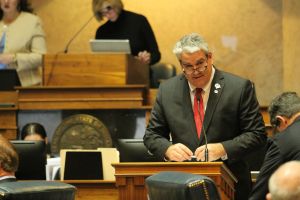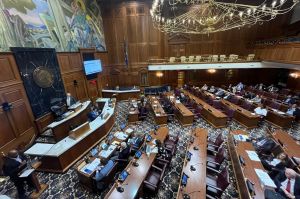
Sgt. Marley Pagel and therapy canine Luna greet a child at a community event. Luna is part of NobleACT, a program designed to address the mental health needs of Noblesville residents. (Photo courtesy of the Noblesville Mayor’s Office)
In recent years, Indiana leaders have jumpstarted conversations about mental health crises but, for one Central Indiana mayor, more could be done to dedicate state dollars to the cause.
“I appreciate state leaders talking about erasing the stigma … (but) I think I was desiring to see more. I want to see something in place to incentivize cities and towns across the state to really invest,” Noblesville Mayor Chris Jensen said in an interview with the Indiana Capital Chronicle. “That’s why I decided, ‘Well, if no one else is going to run with it, then I’m going to.’”
To tackle Indiana’s burgeoning mental health crisis, Jensen is pushing the General Assembly to establish the Indiana Community Cares Initiative, a grant program to shore up local paramedicine programs that proactively address issues in their communities.
As an example of the proposal in action, Jensen points to his community’s NobleACT, which launched in February of 2020 and took on an outsized role during the COVID–19 pandemic.
“We started with one officer, Ben Lugar, and one therapy canine, Luna,” Jensen said of the program, which now has two other specially trained dogs, four other employees and will soon hire a licensed clinical social worker. “They have been an instrumental part of our public safety outreach.”
The donor-funded dogs — Luna, Carbon and Sadie — can comfort children on a domestic violence call as law enforcement addresses their parents or connect with a suicidal veteran, helping community members process their emotions.
Sadie works specifically with the city’s law enforcement, a career with high rates of substance abuse, suicide and domestic violence, so those officers can address their own mental health.
“It’s just a little way that shows… the state has a role to play in this too,” Jensen said. “Let’s move beyond erasing the stigma and actually put a program in place that saves lives.”
Mental health is personal
The COVID-19 pandemic itself came with many surprises, exacerbating existing shortfalls in child care, learning disparities and addiction supports. But the drag on mental health is ongoing and unprecedented, costing billions in unrealized economic potential.
Read more: Hoosier girls are facing an ‘unprecedented’ mental health crisis, according to new report
After a particularly harrowing week in Noblesville, where suicides spiked and overtook COVID-19 deaths in April of 2020, Jensen himself was struggling like many Hamilton County residents. A local therapist, Kristen Dale, approached Jensen and offered to do a Facebook Live video of a therapy session.
Jensen’s first reaction was “hell no,” but after some reflection he concluded that takeaway was “selfish.”
“I probably overshare way too much but it’s easier to live if you just tell everybody your stuff. And everybody’s got stuff so I did it,” Jensen said. “We talked about the emotions around that, the scariness of having three little kids at the time and all of our kids are at home and my wife’s teaching online and what does that look like.”
The first video got 2,000 views and the moment of vulnerability from a “white, male Republican in Central Indiana” inspired others to reach out to Jensen about their struggles, especially older generations unaccustomed to addressing their own mental health.
“Over any road I build or job I helped create, if I can help save a life or lead people to a better life … I can walk away from this job someday feeling like I’ve done something to better my community,” said Jensen, who still hosts Facebook Live therapy sessions on “Mental Health Mondays.”
Getting the bill across the finish line
Jensen recognized the unusualness of a mayor pushing state legislation but has found a champion in Sen. Scott Baldwin, a Noblesville Republican, who agreed to author the proposal.
Baldwin declined an interview with the Indiana Capital Chronicle, saying details hadn’t yet been fully worked out but that he’d speak once he had more information.
However, he added that he had a passion for expanding veteran resources to combat PTSD and suicide — the latter of which received a $1 million line item in the last biennial budget.
“As a retired police officer, I’ve seen firsthand the challenges of untreated mental health in our communities. The success of Noblesville’s NobleACT program underscores the need for proactive approaches like the Indiana Community Cares Initiative,” Baldwin said in an earlier release. “I’m committed to advancing this vital initiative, enabling Indiana to partner with communities in an effort to ensure every Hoosier receives the support they deserve.”
The current proposal suggests a three-year sunset with grants up to $150,000, but Jensen emphasized the need for local flexibility.
“The idea is that, ultimately, these programs should see such great success that they should pay for themselves over time by the reduction of 911 calls,” Jensen said. “But we’ll give you up to $150,000 to place additional personnel within your department, that could be a licensed clinical social worker or that could be a public therapy canine.
“We are going to try to keep the language as broad as possible in order to let communities decide what they need in their space,” he continued.
Previously, Jensen interned at the Statehouse and worked under former Lt. Gov. Becky Skillman. He currently serves as the chair of the Accelerate Indiana Municipalities Legislative Committee — all experiences that will help him navigate this proposal.
Talking through the grant process with the Family and Social Services Administration, for example, would prepare the agency for such a duty and potentially win their support for such legislation.
And, from beginning to end, incorporating data will be paramount.
“I would love to look ahead, ten years from now and be able to pull the data from the Indiana Community Cares database to show how many communities have adopted it … how many people have been served,” Jensen said.
Advice for others
This form of “proactive paramedicine” tries to identify and assess a community’s most vulnerable, relying heavily on a network of people who understand the area and its inhabitants.
For a city like Noblesville, public safety comprises just over 50% of their annual operating budget of roughly $120 million. Department responsibilities have evolved over time from just fires and speeding tickets to include calls dealing with mental health crises, homelessness and drug overdoses.
Rather, the slips, trips and falls of senior citizens living at home independently are making up a “huge proportion” of 911 calls, Jensen said.
“I knew when we came into office, we needed to look at public safety completely differently,” Jensen said.
For another locality looking to implement such a program, Jensen says to start with the data on mental health and public safety, such as pulling call data on 911 services.
“That’s going to help tell your story going forward as to why this need is there,” Jensen said.
Secondly, building those relationships with first responders and healthcare providers to identify hurdles and what’s needed.
Additionally, calls initially increased in Noblesville after they launched and people began recognizing the importance of mental health support, Jensen said.
The work of Community Cares would build upon what legislators have done in the past, such as 2023’s effort to codify and fund 988 suicide hotline services. But moving forward means incorporating mental health services into public safety’s overall, ongoing plan and not just a spurt of temporary funding.
“I think the stigma is well on its way to being erased, but now we have to put real boots on the ground and sometimes that’s where government gets hung up,” Jensen said.











